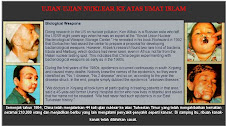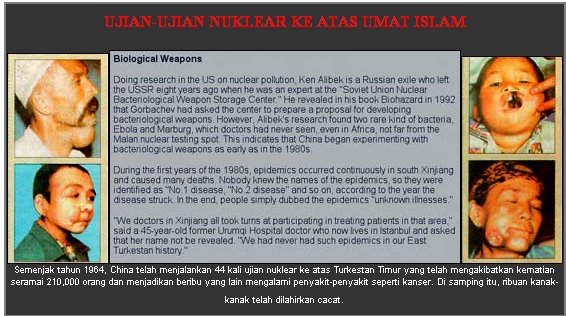Uyghur Woman Found, Facing Abortion
2008-11-17
Authorities find an ethnic Uyghur woman who fled to avoid a forced abortion, which her husband says is now imminent.
KASHGAR, China: A Uyghur man points out directions to women and their children, June 14, 2008.
HONG KONG—An ethnic Uyghur woman in China’s northwestern Xinjiang region who fled a local hospital to avoid a forced abortion has been found by police and taken under guard to a larger hospital, according to her husband.
“The police found my wife,” Nurmemet Tohtasin said in a telephone interview from the Women and Children’s Welfare Hospital in Ili prefecture. “My wife’s father was already at the hospital. They will probably do the abortion today.
”Police tracked down Arzigul Tursun, six months pregnant with her third child, at a relative’s home Monday afternoon, he said. Late Sunday, Tursun had fled Gulja's municipal Water Gate Hospital, where she was scheduled to undergo an abortion against her will.
“Arzigul ran away while the village official who was guarding her went to get her dinner. She left with her slippers, a shirt, and a sleeveless jacket. She didn’t take her bag or her other clothing,” Tohtasin said earlier.
“A village population-control committee member, Bumaryam, told me about this by phone around 8 p.m. The village chief and party secretary took me to the hospital and asked me to find Arzigul. I had to take them to two of Arzigul’s relatives’ homes and to her parents’ home,” Tohtasin said.
“They said if we don’t find Arzigul, they would take our house and our farmland,” he said
. Searched all night
Other relatives, also contacted by telephone, said police had searched their homes looking for Tursun.
The local Party secretary, Nurali, declined to comment, and the Dadamtu township mayor, Juret, hung up the phone. But a nurse at Water Gate hospital confirmed Monday that Tursun had left. “Arzigul ran away,” she said.
Bumaryam, the village official assigned to guard Tursun, said authorities had searched all night Sunday for Tursun and would continue searching until they found her.
China's one-child-per-family policy applies mainly to majority Han Chinese and allows ethnic minorities, including Uyghurs, to have additional children, with peasants permitted to have three children and city-dwellers two.
But while Tursun is a peasant, her husband is from the city of Gulja [in Chinese, Yining], so their status is unclear. The couple live with their two children in Bulaq village, Dadamtu township, in Gulja.
Their experience sheds rare light on how China's one-child policy is enforced in remote parts of the country through fines, financial incentives, and heavy-handed coercion by zealous local officials eager to meet population targets set by cadres higher up.
Detailed policy
On Nov. 11, Tohtasin said, an official named Rashide from the village family planning committee came to their home and escorted the couple, along with Arzigul's father, to the Water Gate Hospital.
There, Tohtasin said, he was pressured into signing forms authorizing an abortion.
Two members of the U.S. Congress have called on authorities in China to release Tursun and cancel the planned abortionRep.
Joe Pitts of Pennsylvania urged officials to "immediately intervene in order to stop any forced abortion from taking place.
”“Though we know Chinese authorities regularly use forced abortions to enforce its coercive population-control program, carrying out this brutal procedure with the world watching Arzigul Tursun’s case would display an utter disregard for any notion of human rights by the Chinese authorities," Pitts said in a statement.
On Friday, Rep. Chris Smith of New Jersey, ranking member on the Congressional-Executive Commission on China, called forced abortions a "barbaric practice" and made a personal appeal to Chinese ambassador Zhou Wenzhong.
Smith said that human rights groups and the U.S. government would be watching carefully to see what happens to Tursun and her family.
On Monday, Smith said he had spoken with Zhou, who said he would look into the case. He said he had also contacted U.S. Ambassador to China Clark Randt and asked him to intervene.
According to China’s official news agency, Xinhua, Uyghurs in the countryside are permitted three children while city-dwellers may have two.
Under “special circumstances,” rural families are permitted one more child, although what constitutes special circumstances was unclear.
The government also uses financial incentives and disincentives to keep the birthrate low.
Couples can also pay steep fines to have more children, although the fines are well beyond most people's means.
The official Web site China Xinjiang Web reports that in Kashgar, Hotan, and Kizilsu [in Chinese, Kezilesu], areas populated almost entirely by Uyghurs, women over 49 with only one child are entitled to a one-time payment of 3,000 yuan (U.S. $440), with the couple receiving 600 yuan (U.S. $88) yearly afterward.
China's official Tianshan Net reported that population control policies in Xinjiang have prevented the births of some 3.7 million people over the last 30 years.
And according to China Xinjiang Web on Sept. 26, 2008, the government will spend 25.6 million yuan (U.S. $3.7 million) this year rewarding families who have followed the population policy.
The one-child policy is enforced more strictly in cities, but penalties for exceeding a family's quota can be severe, including job losses, demotions, or expulsion from the Party, experts say.
Officials at all levels are subject to rewards or penalties based on whether they meet population targets set by their administrative region. Citizens are legally entitled to sue officials who they believe have overstepped their authority in enforcing the policy.
Tense relations
Relations between Chinese authorities and the predominantly Muslim Uyghur population have a long and tense history, with many Uyghurs objecting in particular to the mass immigration of Han Chinese to the region and to Beijing’s population-control policy.
Uyghurs formed two short-lived East Turkestan republics in the 1930s and 40s during the Chinese civil war and the Japanese invasion.
But China subsequently took control of the region, and Beijing has in recent years launched a campaign against Uyghur separatism, which it calls a war on Islamic terrorism.
It has also accused “hostile forces” in the West of fomenting unrest in the strategically important and resource-rich region, which borders several countries in Central Asia.
Print... E-Mail this story
Thursday, November 20, 2008
Subscribe to:
Post Comments (Atom)









No comments:
Post a Comment